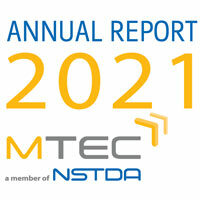Siam Modified Starch Co., Ltd. is a global leader in the native tapioca starch and modified tapioca starch industry. The company is a pioneer in applying modern technology to add value to tapioca starch for use in various industries including food, paper, textiles, glue, as well as building and construction. More than 50% of modified tapioca starch products are used in the food industry, which is one of the company’s core business, and more than 80% of all products are exported. The company has three modified tapioca starch factories located in Pathum Thani, Chaiyuphum, and Buriram provinces with a total production capacity of approximately 400,000 tons per year, making it the largest manufacturer of modified tapioca starch in Thailand.
Dr. Siwarutt Boonyarattanakalin, Assistant Innovation Director of Siam Modified Starch Co., Ltd., said that the company’s core value is innovation, which gives the company a distinct advantage over most other starch manufacturers. The company has had a long-established research team for the past 36 years, resulting from the vision of Dr. Werawat Lertwanawatana, the chief executive officer of Siam Modified Starch Co., Ltd. He has created the research team and has long been a champion of the company’s R&D activities. It has been proven many times that the research results have made the customers interested in purchasing products from the company.
The company places importance on thermoplastic starch research conforming to the BCG (Bio Circular Green) Economy and is aware of the problems caused by plastic waste pollution and fossil fuel depletion. The company’s products are mainly produced from starch derived from cassava plants that absorb carbon dioxide, which could be considered part of the Circular Economy, and the ones produced from trees are in alignment with Green Economy and Bioeconomy.
“Biodegradable polymer is one of the crucial factors in making the use of plastic more sustainable. However, the global biodegradable polymers market size is very small, only 1% compared to that of the global plastic market. This poses a challenge for anyone trying to increase this number.”
“As the prices of biodegradable polymers, namely, PLA, PBAT, PHA, and PBS are quite high, the company, therefore, promotes the way to lower the prices by blending low-cost thermoplastic starches into biodegradable polymers. The company expects that this method would encourage people to use more biodegradable polymers, thus contributing to more sustainability for the world.”

For all these reasons, the company has thus cooperated with MTEC on the R&D of thermoplastic starch, and a polymer blend between biodegradable polymer and thermoplastic starch produced by twin screw extrusion process.
The company realizes that MTEC has various expert research teams and pilot-scale equipment. At the early stage of the project, the company had done a risk assessment, made a project plan but still had not put much money into investment. At that time, MTEC and other government agencies had been helping the company, then the company continue to develop products with more investment as the project had achieved more success.
Dr. Siwarutt remarked that MTEC had provided the necessary equipment which helps the company’s research team takes off to a good start. The skill and expertise of MTEC research team are vital to the success. The collaboration between the two research teams is excellent.
Once the research had been completed, the company proceeded to apply the basic knowledge and preliminary research work to further develop its business at the industrial level and manufactured the products named “TAPIOPLAST® series.”
The company also places importance on the development of food products for people with dysphagia by developing a thickening powder to meet the needs of patients and the elderly, of whom the number is growing.The company had cooperated with MTEC on the research and development of a mixture of maltodextrin base that can be used as a thickening agent to adjust the viscosity of food for people with dysphagia.
Dr. Siwarutt said that after the research is completed, the company had created a product prototypes and developed its production processes conforming to international standards under the name “HI-PERSE™ CLEAR”. As of 2021, the products have been tested by customers.
The preliminary research is considered successful and the products work well. However, the thickening agent is the company’s new product for the elderly and classified as a medical food in Thailand, which could take time to be further developed and there are a number of barriers to overcome. Furthermore, cooperating with hospitals is also a new challenge for the company. The company must be prepared and study various rules and regulations related to the hospital, as well as set up a specific team to carry out these undertakings.
The company greatly appreciates working with MTEC and the results are in line with its plan and the specified time. MTEC research teams have provided knowledge transfer in both theory and practice, and assistance to the company more than planned. In the future, the company plans to continue to conduct R&D with MTEC to further develop the research results.
Lastly, Dr. Siwarutt suggested that it would be great if MTEC could provide more pilot-scale equipment to support the need for the diversification of product development services.

